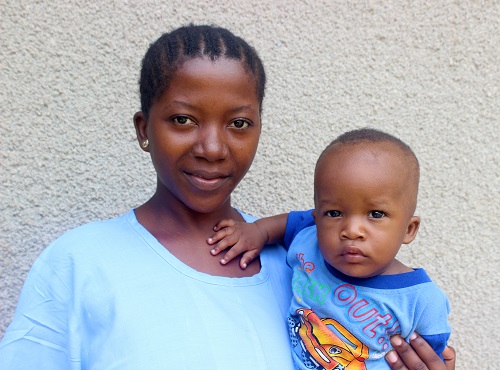Women Making it Happen: Esther
A story of endurance and recovery

One week from International Women’s Day on March 8th, we’re celebrating women who inspire us. Meet Esther!
Esther arrived at the health center in Tanga as a 24-year-old expectant mother and business woman, with a supportive family and a bright future. She returned home with a healthy baby, but also a devastating condition that threatened to diminish that future. Obstetric fistula.
Despite a traumatic 12-hour delivery, Esther’s baby survived. The baby was both too big and lying in a position that made the delivery very difficult. Staff at the Tanga health center were able to deliver the baby, but the damage to Esther’s body had already been done.
Five days after returning home, Esther noticed she was leaking urine.
Learning to Live with Fistula
“I did not know what fistula was before I developed it and I was not sure why I was leaking.”
“After I developed fistula, I stayed at home with my parents. I was very sad that I could not go to any celebrations or to see my neighbors because I would be ashamed for anyone to see my leaking.“
Isolation and marginalization walk hand-in-hand with fistula, as the pervasive smell of leaking urine and feces, and the lack of understanding surrounding the condition, often push friends and family to reject the woman living with the condition. Thankfully, Esther’s relatives were understanding and supportive, and refused to separate from her. She did, however, experience a different type of loss.
“Before I had fistula, I owned a cosmetic shop. After my baby was born, I could not go back to my cosmetic shop because I had spent the money that I would need to purchase more supplies for my business on my health and fistula expenses. I also had to spend more time washing my clothes because I was leaking in them a lot and I did not want to leak in front of my customers.”
Hope Delivered
Esther lived with fistula for seven months before she was offered any hope of a restored life. A doctor in Tanga told her about an organization called CCBRT in Dar es Salaam, and informed her that her condition was treatable. Esther traveled the 200 miles to CCBRT, and was admitted for fistula repair surgery. In a new city, preparing to undergo surgery, she naturally had concerns.
“Before surgery, I was worried that I would be in pain and that it would not be successful.”
Esther’s surgery was successful, and she is now recovering pain-free at CCBRT. She is happy to be completely dry, and to have her beautiful, healthy son. She will soon be able to return home to her family and community. When asked what message she would like to send to other women in Tanzania who are living with fistula, she replies:
“Fistula is treatable. When you have fistula, go to CCBRT for treatment.”
Kupona Foundation is proud to partner with CCBRT as they deliver hope and restore futures to thousands of women like Esther every year.
Next Sunday, March 8th, we will celebrate International Women’s Day with one final story to conclude our Women Making it Happen blog series. Join us as we honor an American woman who went the extra mile to support women living thousands of miles away. These women demonstrate that change is not only possible, it is happening – building stronger communities and creating better futures for women and families in Tanzania.

